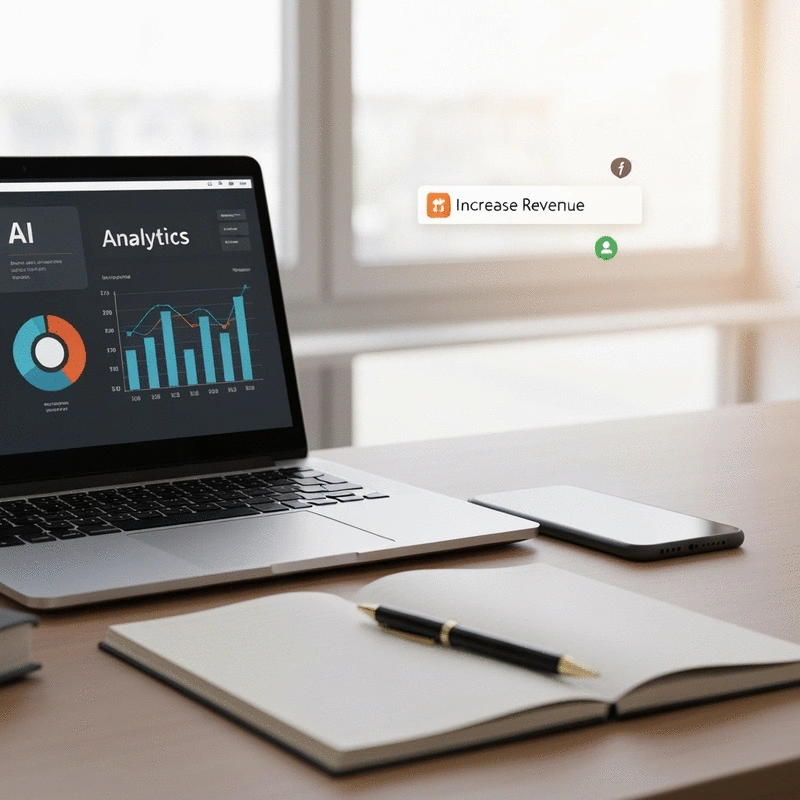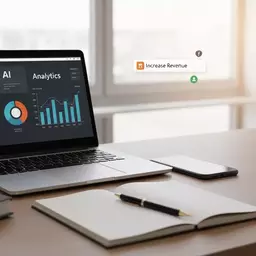AI Tools Driving Lead Generation & Sales Conversion
- Automated Lead Scoring: AI prioritizes high-potential leads.
- Personalized Marketing: Tailored messages for different segments.
- Predictive Analytics: Forecasts future trends based on sales data.
As the digital landscape evolves, small businesses are discovering that artificial intelligence is not just a trend but a vital tool for driving growth and efficiency. How can these businesses leverage AI to enhance their operations and profitability?
Small businesses are increasingly leveraging AI to boost efficiency, enhance customer experience, and drive revenue. The visual below highlights key areas where AI tools and machine learning are making a significant impact.
In today’s fast-paced business environment, integrating artificial intelligence (AI) can significantly influence revenue growth for small businesses. As I’ve seen through my journey with My AI Business Coach, AI isn't just a buzzword; it’s a transformative tool that can streamline operations and enhance profitability. Many small business owners are now recognizing the potential of AI to not only automate tedious tasks but also drive strategic decisions that lead to increased revenue.
Let's explore why small businesses should consider AI integration and how it can serve as a critical driver for growth in today’s digital marketplace!
Integrating AI into your business strategy can feel overwhelming, but the benefits are undeniable. Here are some compelling reasons to consider:
By leveraging these advantages, small businesses can stay competitive and responsive to market demands. Have you ever thought about how much time you could save by automating your customer service inquiries?
AI tools are revolutionizing the way small businesses approach lead generation and sales conversion. They can analyze customer behavior to identify high-quality leads, ensuring that your sales team focuses on prospects with the highest potential. Here’s how:
When I work with businesses on lead generation strategies, I often emphasize the importance of utilizing these AI capabilities to transform potential leads into loyal customers. It’s all about working smarter, not harder!
Machine learning, a subset of AI, plays a pivotal role in enhancing revenue growth for small and medium-sized businesses (SMBs). It continuously learns from data and improves its predictions over time, which can have a profound impact on your bottom line. Key benefits include:
As I guide my clients through these transformations, I often emphasize the potential of machine learning to create lasting impacts on revenue. Just imagine being able to predict customer needs before they even express them!
As we explore the transformative impacts of AI on small businesses, we'd love to hear from you! How do you feel about integrating AI into your business strategy?
As we delve deeper into the world of artificial intelligence, it's essential to understand how small and medium-sized businesses (SMBs) are navigating this transformative landscape. The integration of AI is not just a trend—it's becoming a fundamental component of growth strategies. Recognizing current trends in AI adoption can empower you to make informed decisions that align with your business goals.
One of the first steps in this journey is understanding the investment patterns that underscore AI adoption. Are you curious about how your peers are capitalizing on AI? Let’s explore the current investment trends reshaping the future of small businesses!
Recent studies show a significant uptick in AI investments among small businesses, as owners increasingly recognize the potential benefits. According to the Federal Reserve's research on AI uptake, more businesses are integrating these technologies into their operations. Here’s a snapshot of current investment trends:
By embracing these trends, you can position your business as a forward-thinking entity ready to leverage AI for competitive advantage. It's not just about keeping up; it's about staying ahead!
Despite its potential, skepticism about AI remains. Many small business owners worry that AI is too complex or expensive. Acknowledging these misconceptions is crucial for fostering a positive attitude towards AI adoption. The Bipartisan Policy Center's report on small businesses navigating the AI frontier offers valuable insights into these challenges. Here are some common beliefs that can be addressed:
By overcoming these misconceptions, you can foster a culture of innovation within your organization and encourage greater acceptance of AI technologies.
Digital transformation is no longer a luxury; it's a necessity. For small businesses, AI is at the heart of this transformation. It offers powerful insights and optimizes processes, driving efficiency and revenue. The Stanford AI Index Report consistently highlights the growing importance of AI in various sectors, including small businesses. Here are a few ways AI is playing a pivotal role:
As you consider these aspects, think about how embracing AI tools can lead to a more agile and responsive business model. The future is digital, and with the right AI tools, you can thrive!
AI integration offers several key benefits, including increased efficiency through task automation, data-driven insights for better decision-making, and enhanced customer experiences through personalization. These advantages help small businesses stay competitive and responsive to market demands.
AI tools drive lead generation and sales conversion by automating lead scoring, which prioritizes high-potential leads. They also enable personalized marketing campaigns tailored to different customer segments and use predictive analytics to forecast future trends based on sales data, optimizing sales strategies.
Machine learning significantly impacts SMB revenue growth by improving demand forecasting for better inventory management and cost reduction. It also optimizes ad performance through targeted advertising based on consumer data and helps in proactively addressing customer churn risks through effective retention strategies.
Current investment trends show that small businesses are allocating higher budgets for technology, particularly for AI tools. Many are also forming partnerships with AI solution providers for bespoke tools and prioritizing training and development to equip staff with necessary AI skills.
Common misconceptions include believing AI is only for large corporations, that it will replace human jobs, or that it involves prohibitively high initial costs. In reality, AI tools are increasingly accessible for businesses of all sizes, primarily enhance human capabilities, and often come with scalable pricing models.
Here is a quick recap of the important points discussed in the article:



 Have you ever wondered how artificial intelligence can reshape consumer behavior and decision-making
Have you ever wondered how artificial intelligence can reshape consumer behavior and decision-making
 As the digital landscape evolves, small businesses are discovering that artificial intelligence is n
As the digital landscape evolves, small businesses are discovering that artificial intelligence is n
 Did you know that personalized marketing can lead to a revenue increase of up to 30%? In an era wher
Did you know that personalized marketing can lead to a revenue increase of up to 30%? In an era wher
 Are you aware that reactivating dormant customers can significantly enhance your business growth? Ma
Are you aware that reactivating dormant customers can significantly enhance your business growth? Ma